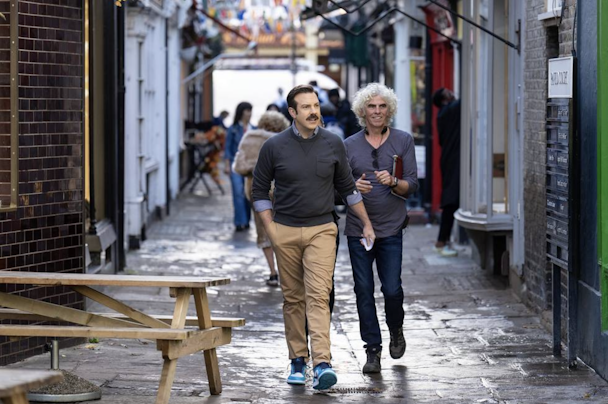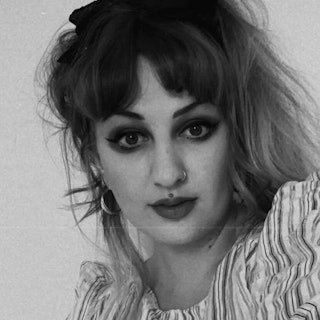Ted Lasso director Declan Lowney on his love for making ads
As part of The Drum’s Entertainment Focus, the acclaimed comedy director talks through his early inspirations, what makes a great ad and the iconic sitcoms that he holds dear.

Declan Lowney and Jason Sudeikis
Growing up in Wexford, Ireland, in the 1970s, Declan Lowney’s first exposure to the ‘film industry’ came when his uncle shot a vampire movie on his Super 8. At a makeshift ‘premiere,’ a young Lowney watched the town’s enraptured residents see themselves and where they lived up on the big screen (despite that ‘screen’ being nothing more than a bedsheet) and knew he wanted to provoke such a reaction himself.
Quickly, he became a “film nerd,” spending his childhood and teenage years shooting short movies on that Super 8, which he entered into (and won) local amateur film competitions. There being no film school at the time for him to enroll in, Lowney got his first foot in the door as a runner for a production company in Ireland before a job came up at RTÉ when he was 19, which he says he grabbed with both hands.
Advertisement
Execs at the public service broadcaster soon took notice of how he liked to champion young people, and before long, he was given jobs filming live music shows, which led to his first big breakthrough, the 1988 Eurovision, which Ireland was hosting.
“They let me direct it because they wanted Eurovision to have a bit of a shake-up and a younger feel. We made it a very high-energy show that looked much more like the music shows I’ve been doing.”
In 1995, after a few years focused solely on music-related content, Lowney’s career was catapulted to a whole new level when he began working on the legendary Irish sitcom Father Ted. He recalls trying to get the show picked up and how he and the writers were “three young Irish guys in London, trying to make the Brits understand what Father Ted meant.”
Advertisement
The show went on to be a huge hit, of course, winning countless awards and the affection of a nation, but Lowney says they were still very much trying to figure it all out that first season, it being so different from anything else on TV at the time.
“It had a lovely edge of surrealism about it. We were able to tune into that slightly weird, silly, daft Irishness without ever being offensive to people.” The show ran for three seasons until the untimely death of lead character Dermot Morgan in 1998.
Lowney was then propelled into the world of comedy, eventually working on TV shows in the UK, including Cold Feet and Little Britain.
“I always had a hankering for Hollywood, however, and about 10 years ago, I started going over. Then, five years ago, we took the plunge and moved over.”
In 2020, he was brought on to be a producer and director on Apple’s Ted Lasso show. “It changed everything, really – I got one of those,” he says, nodding at the Emmy he won for Outstanding Comedy Series.
Suggested newsletters for you
The director continues to come back over to the UK to work, however, including to direct ad campaigns for brands such as Warburtons, Santander and Halifax. He says he loves making ads and bluntly states that you can make more money than working on TV and that it doesn’t take as long.
He is particularly proud of Warburton’s ‘Mad About the Bread’ campaign, which he has been involved in since the beginning, 12 years ago, explaining that it is completely different from anything else. The ads have featured some of Tinseltown’s most-renowned actors, including Robert DeNiro and Samuel L Jackson.
Treating the audience with respect is key, says Lowney; good comedy advertising comes when the gags are a little bit sophisticated. On Warburton’s, Lowey says the brand takes its product seriously but not itself and that Billy Faithful, who was creative director on the project, is completely in Jonathon Warburton’s head.
“Warburton’s has been absolutely brilliant in trusting us, which is so usual in advertising. So much of it is prescriptive, kind of because it has to be. Clients want to know exactly what they’re going to get before they spend the money. But when you make a funny ad, you just want that space to play and make it funnier.”
Lowney says he still loved going to work and, surprisingly, still gets that nervous feeling that he believes is important. In the past, he would get antsy around actors but soon realized that they wanted to do a good job, too, adding that they can “smell fear and incompetence.”
“My sets are happy sets and I’m lucky to work on these shows. I mean, Jason Sudeikis... what a performer. Everybody has a great time. I don’t think you can make funny comedy if there’s a miserable atmosphere on the set.”
The director has always had that mentality. Coming from a family of six kids, you had to do more to be noticed, he says. His older brothers were extremely quick-witted and he loved the repertoire around the table at mealtimes, while he says he has always had the Irish tendency towards self-deprecation.
“At school, I used to mess around and do impressions of teachers. There’s a bit of a performer in here. I got the nickname ‘Clowney Lowney’ and it never disappeared. Years later, being able to make money off the back of your nickname kind of feels fun.”

